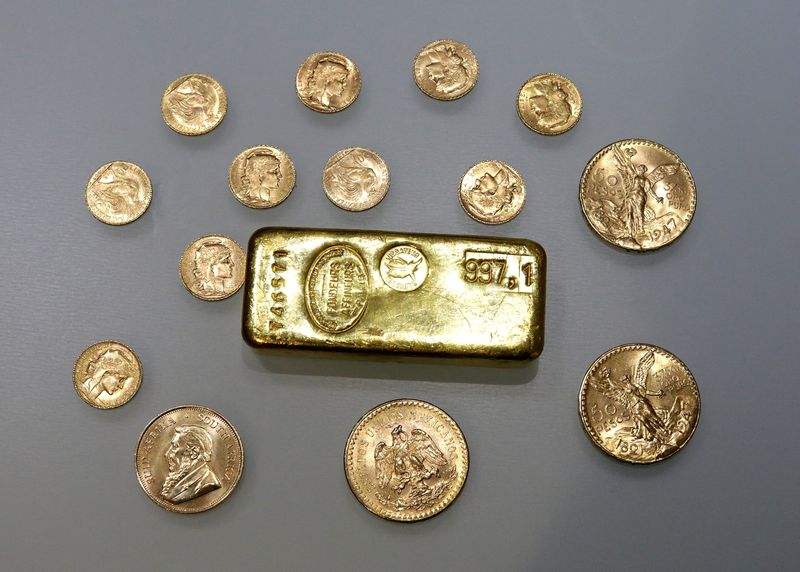By Chris Taylor
NEW YORK (Reuters) - What asset class do millennials and Gen Z investors both want to own?
Here is an answer you may not have guessed: Gold.
Among wealthy investors under the age of 43, 45% own gold as a physical asset, and another 45% are interested in holding it, according to a recent study by Bank of America Private Bank.
Those are far higher percentages than other age groups.
Usually this demographic is not interested in assets like gold, cash or Treasuries, because they are considered to be "boring," says Liz Young Thomas, head of investment strategy for digital financial services firm SoFi (NASDAQ:SOFI).
"As Treasury yields rise, cash is paying a high interest rate, and gold is rising along with it. We are seeing returns we normally don’t see in such a short period of time," Thomas says. "Naturally, when assets have strong returns, younger audiences start to perk up.”
This confirms another study by money managers State Street (NYSE:STT), which finds that millennials have the highest allocation to gold in their portfolios, at 17%, far outpacing both boomers and Gen X at 10%.
So what is going on? Why are younger investors so intrigued by a somewhat stodgy asset that has been around for thousands of years?
Part of gold’s renewed buzz is its healthy spot price, which as of this writing is above $2,400 per ounce.
It is also increasingly on the shelves in popular retail environments, which boosts visibility. Big-box chain Costco (NASDAQ:COST) started selling 1-oz gold bars last fall and has been doing a brisk trade of up to $200 million monthly, according to Wells Fargo estimates.
Since younger investors’ interest has been piqued, what golden rules should they keep in mind? A few thoughts from the experts:
OWNING PHYSICAL GOLD CAN BE TRICKY
Part of the appeal of gold is that it is tangible. If the world’s financial system happens to go haywire, or currencies collapse, at least you would have something real to hold onto.
“I have found with my millennial clients that as they get wealthier, they are more interested in investing in directly-held, self-custodied gold,” says Eric Amzalag, a financial planner in Canoga Park, California, whose clients tend to use online precious metals retailer APMEX. That is because investment goals often shift from growth to capital preservation, Amzalag adds.
With physical gold you have unique challenges like: finding a reputable dealer who won’t take advantage of you; getting it delivered and stored securely; insuring your purchase; And then figuring out how to eventually sell it, since Costco is not about to buy that gold bar back from you.
To protect your portfolio, check out this advisory guide from the World Gold Council.
CONSIDER ETFS
An exchange-traded fund – either backed by physical gold, or one that invests in gold futures – takes away the problems of buying, storing and selling. It also makes asset exposure relatively easy.
“There are some fees associated with that, but ETFs are a nice alternative if you don’t want to actually take delivery of bullion and hold it in your basement,” says SoFi’s Thomas.
The largest such ETF, SPDR Gold Shares (NYSE:GLD), carries an expense ratio of 0.4% and boasts one-year returns of more than 23%. A similar approach is to buy an ETF comprised of mining stocks, such as VanEck Gold Miners (GDX (NYSE:GDX)), which includes the biggest names in the sector like Newmont Corp. and Barrick Gold (NYSE:GOLD).
DO NO GO OVERBOARD ON ALLOCATION
Gold can certainly serve a purpose in a portfolio, as an uncorrelated asset and a potential hedge against inflation or volatility. But, as a commodity, it can also be quite volatile and fall in and out of favor with investors.
As such, equities should still be the main portfolio entrée for most investors, experts say. Companies that generate sales, earn profits, pay dividends and offer potential share-price appreciation make for a more dynamic asset class with superior long-term returns.

As for gold, younger investors may keep it as a complementary side dish, says Jonathan Cameron, a financial planner in Miami.
“We work with many young professionals, and we have been including a gold ETF (about 5%) in many of our clients’ portfolios as a hedge for several years,” Cameron says. “Everyone likes this decision.”